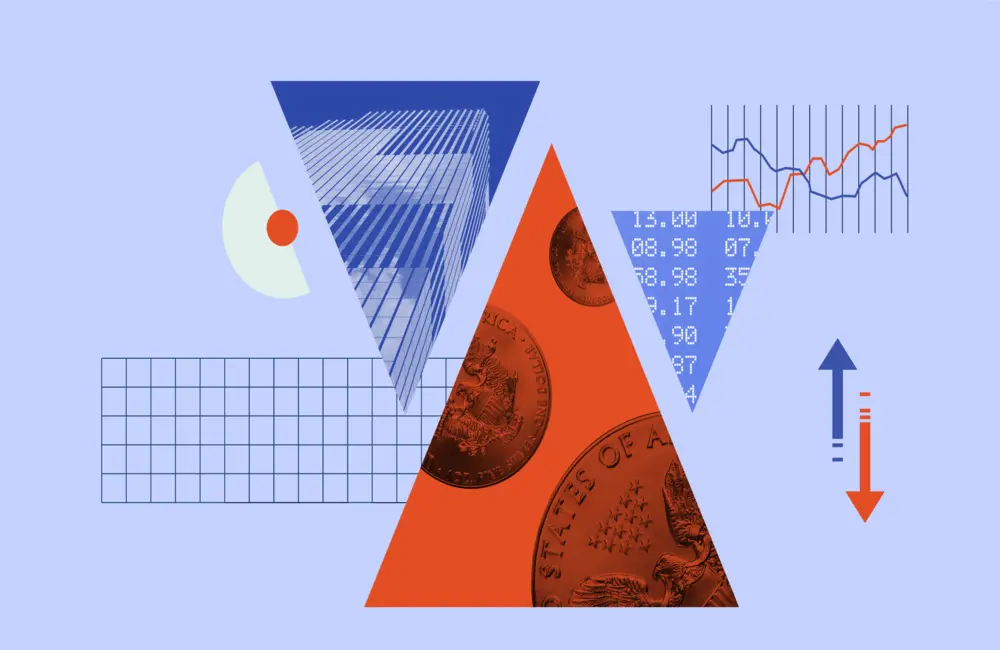ASX futures were up 37 points, or 0.5 per cent, to 6905 at around 8.00 am AEST, pointing to a strong start for trade.
The S&P 500 gained ground on Monday but ended its worst month since March 2020 as expectations for higher interest rates cool enthusiasm for stocks.
On the last trading day of January the S&P 500 rose 1.9 percent, and the Dow Jones Industrial Average was up 1.2 percent, or about 406 points. The tech-heavy Nasdaq Composite rose 3.4 percent, making up for some of its monthly losses. The daily gains added on to a rally on Friday for all three indexes.
In Australia, the S&P/ASX 200 finished 0.2% down at 6971.6 after tech stocks helped the benchmark trim earlier losses.
The index fell 0.8% shortly after the open, reversing part of Friday’s 2.2% rise. It slowly recovered and dipped into positive territory briefly in the afternoon before it fell back again. Local tech stocks took their cue from their US peers, with Appen, WiseTech and Life360 gaining between 4.45 per cent and 7.3 per cent.
The heavyweight finance sector was the biggest drag, with Westpac, Macquarie, NAB, Commonwealth, and ANZ losing between 1.6% and 3.4%.
Spread the word Ansell sank 14% after cutting its earnings outlook, making it the bottom ASX 200 performer.
Overseas, the pan-continental Stoxx Europe 600 rose 0.7 percent. In Asia, markets in China and South Korea were closed for a holiday. The Hang Seng in Hong Kong and the Nikkei 225 in Japan each gained over 1%. Macau Legend Development shares dropped 19% in Hong Kong following media reports of its chief executive’s Sunday arrest on suspicion of money laundering and illegal gambling, including running online casinos.
In commodities, gold futures rose 0.7% to $US 1799.30 a barrel; Brent crude gained 1.3% to $US91.21; Iron ore fell 4.2% to US$141.75 a tonne.
In bond markets the yield on the Australian 10-year bond fell for a second day to 1.89%, while the US 10-year Treasury yield crept up to 1.79%. Yields fall when prices rise.
The Australian dollar was fetching US70.67 cents at 8.00 am AEST and 69.90 the previous close. The WSJ Dollar Index, which measures the US dollar against 16 other currencies, fell to 90.29.
Asia
Chinese markets are closed all week for the Chinese New Year holidays.
Hong Kong shares closed higher in a half-day session, aided by tech sector advances that followed the Nasdaq Composite's 3.1% surge on Friday. Meituan and NetEase each rose over 5%, while Alibaba Group was up 3.6% and Tencent Holdings gained 2.6%. Among the other top gainers were Shimao Group, up 4.6% after announcing plans to sell its Shanghai hotel asset for CNY4.5 billion, which will be used to reduce debts. CanSino Biologics gained 4.8% after it forecast swinging to net profit for 2021 on sharply higher revenue. Over the weekend, Macau Legend Development announced the arrest of its CEO. The stock closed 19% lower. Galaxy Entertainment fell 2.2% and Sands China dropped 0.7%. The Hang Seng Index added 1.1%, up 1.7% for January. The market will remain closed for the Chinese New Year holidays until Friday.
Japan’s Nikkei Stock Average gained 1.1%, after going from losses to gains on the back of better US stock futures. But positioning in financial markets was likely to remain volatile in the near term with much of Asia away for the Lunar New Year holidays earlier in the week, Maybank added. Leading gainers were shipping firms, with Mitsui O.S.K. Lines surging 9.6% and Nippon Yusen K.K. rising 7.2%. Recruit Holdings rose 5.5% after announcing a share buyback.
Europe
Shares mostly advanced on both sides of the pond as sentiment brightened after last week’s US Fed news. The pan-European Stoxx 600 was up 0.7% on Monday, wrapping up the month down 3.9%.
“Better levels to start the new week, building on Friday’s bounce for Wall Street -- investors are beginning to get glass-half-full after last Friday’s sell-off,” says Chris Beauchamp, chief market analyst at IG. “Now that the Fed is out of the way for now, a calmer outlook prevails, even if we still have some big-names earnings yet to come.”
In London, the FTSE 100 dipped 0.02% in what’s been a rollercoaster month for the index. While it lagged today, the FTSE 100 has largely beaten other markets in Europe in January as a whole, according to Michael Hewson, chief market analyst at CMC Markets UK. “The UK benchmark has held up pretty well on the month to be fair while other markets here in Europe have had a bit of a tougher time,” Hewson says. The index has gained 1.1% for the month.
North America
The S&P 500 gained on Monday but finished the month with its worst performance since March 2020, as higher interest rate expectations sap enthusiasm for the stocks.
On the last trading day of January, the S&P 500 rose 1.9 percent and the Dow Jones Industrial Average 1.2 percent, or around 406 points. The tech-heavy Nasdaq Composite added 3.4 percent, clawing back some of its monthly losses. The gains added to a rally Friday for all three indexes.
The wide US stock index has slipped 5.3% in choppy January dealing as investors confront the extent to which tighter monetary policy would boost influence fairness valuations. High inflation and a strong labour market have prompted Federal Reserve officials to speed up their plans to withdraw support for the economy.
Last week the central bank signalled that it would start to lift rates gradually in mid-March. In recent weeks, the concerns were: the prospect of a Russian invasion of Ukraine and the rise of the Omicron variant of Covid-19.
The set of worries has induced declines across the stock market, with 10 out of the 11 sectors in the S&P 500 retreating in the new year. Just energy stocks have defied the downward trend.
“January surprised a lot of people,” said Wayne Wicker, the chief investment officer at MissionSquare Retirement. “Everyone was anticipating volatility, but I think that the selloff in January probably surprised people.”
The Federal Reserve’s shift rattles a key pillar under stocks. Investors praise the central bank’s near-zero short-term interest rates and bond-buying program for fueling the stock market’s run up from its lows in March 2020. Even after the retreat in recent weeks, the S&P 500 is trading at roughly twice its closing low that month.
Technology stocks have plummeted this month as investors weigh how rising interest rates could take a particularly heavy toll on the group’s pricey valuations, which hinge in part on expectations for growth well into the future. Microsoft shares have fallen 7.5% in January, and Nvidia shares have tumbled 17%.
The Nasdaq Composite is down 9% in January, on track to be its worst month since March 2020.
“Tech was just extremely highly valued, extremely overbought,” said Dustin Thackeray, chief investment officer at Crewe Advisors. “It was definitely overdue for a pullback.”
January has been characterized by big days both up and down, and sharp intraday reversals.
“It has been very volatile so far this year,” said Louise Dudley, an equities portfolio manager at Federated Hermes. “Interest-rate expectations keep getting higher and people are especially concerned.” "We’re certainly seeing from the US they are so on top of the inflation numbers — they’ll do whatever they can."
Ms. Dudley said she anticipates volatility will ease as investors gain greater clarity about whether inflation has peaked and how companies forecast being impacted by rising costs for energy, labor and materials.
Investors are looking for hints about companies’ outlooks as corporate earnings season rolls on. Profits for companies in the S&P 500 grew 24% in the fourth quarter compared with a year earlier, analysts expect, according to FactSet. Roughly one-third of the companies in the index have reported.
Earnings have come in strongly, and so many stocks are down so far this year, that some investors wonder whether the market will rise from here.
“I think there’s a reasonably good chance that last week was a short-term bottom,” said Andrew Slimmon, senior portfolio manager at Morgan Stanley Investment Management. “The weakness has not been validated by the fundamentals”
In individual stocks, Netflix shares rose 11% Monday after a Citigroup ratings upgrade and share purchases by Co-Chief Executive Reed Hastings.
US-traded shares of Sony climbed 4.5% after Sony Interactive Entertainment LLC said it was acquiring video game maker Bungie. Earlier in January, Microsoft announced it would acquire video game giant Activision Blizzard.
Shares of Citrix Systems fell 3.4 percent after the cloud-computing company said it would be taken private in an all-cash deal valued at $16.5 billion.
Shares of L3Harris Technologies fell 4.3% after the aerospace and defence company provided a bleak revenue forecast.
In bond markets, the yield on the benchmark 10-year US Treasury note was also steady, rising to 1.780% Monday from 1.779% Friday. But the monthly jump in yield was the biggest since March 2021.






















